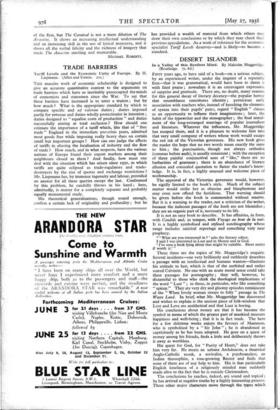TRADE BARRIERS
Tariff Levels and the Economic Unity of Europe. By H. Liepmann. (Allen and Unwin. 2 Is.)
THIS massive work of economic scholarship is designed to give an accurate quantitative content to the arguments on trade barriers which have so inevitably preoccupied the minds of economists and statesmen since the War. To say that these barriers have increased is to utter a truism ; but by how much ? What is the appropriate standard by which to compare specific and ad valorem duties ; duties imposed partly for revenue and duties wholly protectionist in intention ; duties designed to "equalise costs of production" and duties successfully aiming at total exclusion ? How should one estimate the importance of a tariff which, like that of "free trade " England in the immediate pre-crisis years, admitted most goods free while imposing really heavy dues on certain small but important groups ? How can one judge the effects of tariffs in altering the localisation of industry and the flow of trade ? How much, and in what respects, have the various nations of Europe found their export markets among their neighbours closed to them ? And finally, how must one deal with the situation which has arisen since 1931, in which tariffs are quite eclipsed as trade-regulators and trade- destroyers by the rise of quotas and exchange restrictions ? Mr. Liepmann has, by immense ingenuity and labour, provided an answer for all these queries except the last. Confronted by this problem, he candidly throws in his hand ; here, admittedly, is matter for a completely separate and probably equally monumental study.
His theoretical generalisations, though sound enough, confess a certain lack of originality and profundity ; but he
has provided a wealth of material from which others may draw their own conclusions or by which they may check their previous speculations. As a work of reference for the econorm, specialist Tariff Levels deserves—and is likely—to become a standard.


















































 Previous page
Previous page